|
Houston's March for Science did not completely suck. The turnout was sizable for a demonstration in Houston: I would estimate 3-5 thousand science fans of all ages. Those in attendance brought eye-catching, nerdily LOL signs and T-shirts: e.g., "If you're not part of the solution, you're part of the precipitant" and "Girls just want to have fun(ding for their research)." But the speeches from the steps of City Hall were mostly mediocre at best, missing the point entirely at worst. The point, supposedly, is that government funding for the sciences is in jeopardy from a science-hostile administration and Congressional majority. With all the organizers' noble aims at a non-partisan event, the speakers missed multiple opportunities to point out the adversary and tell the assembled thousands what they might do to overcome that adversary. The organizers did a lot of things right, including arranging for a permit to use the streets to march from Sam Houston Park to the City Hall steps. I got nostalgic for Occupy Houston's marches, which would stop at the fossil fuel companies' buildings to educate people about those companies' evil deeds. It felt a little weird not having cops there to corral us back onto the sidewalks, or clubbing people who crossed against the signals. DePinho On Point The only speaker who prescribed any action was, fittingly, Dr. Ronald DePinho, the former president at MD Anderson Cancer Center. DePinho recently resigned after six turbulent years at the helm of the Good Ship Anderson. Almost as soon as he arrived in 2011, he began stepping on some very prestigious toes by redirecting funding to his "moon shot" initiative involving gene mapping and genetic therapy for various cancers. He brought in top researchers from all over the world, effectively sending the message that the faculty at the nation's foremost cancer hospital weren't good enough. He did all this while insisting in interviews that he was implementing a less top-down structure—that, indeed, he was working for the faculty and staff. Generally, you don't get to be president of a major academic institution like MDACC without some political acumen. Among various platitudes about the importance of science, DePinho urged us do some politicking ourselves. He advised those assembled to contact three Congresscritters before a big budget cut for the National Institutes for Health comes up for a committee vote this coming Friday: Senate Appropriations Chair Roy Blunt (R-MO), ranking Democrat on Appropriations Patty Murray (D-WA), and House Appropriations Chair Tom Cole (R-OK). After sitting on the lawn facing City Hall and listening to about eight speakers, it seemed as if the speakers were having a contest to see who could utter the word science the most in a five-minute speech. There was far too much "Science is awesome! You can make a living doing science!" For my taste, there wasn't nearly enough "Science is under attack by a cadre of fascist wannabes who'd rather build big walls and drop big bombs on brown people, and who will personally profit from the ongoing climate disaster." A theoretical astrophysicist who had spent his entire career in oil & gas continued the whole "Science is teh awesome" theme, by which time I'd had my fill. I told a churchmate nearby, "I think I'm getting platitude poisoning. I'm gonna go." Earth Day's Lament: They Co-opted Me with Science! The climate received very short shrift. After a few medical professionals had spoken, as well as a high school student and a college student who won essay contests, I turned to my churchmates and asked, "Since it's Earth Day, I wonder if we're going to hear anything about earth science. As it happened, the next speaker was Rice University geochemist Dr. Laurence Yeung, who studies climatic systems. What did he say about climate science in his speech? Approximately diddly-squat. He did reminisce about his childhood dream of playing in the NBA, how his lack of vertical growth thwarted that dream and drove him instead into the sciences, and how he enjoyed making things explode in chemistry lab.
Earth Day died screaming. Apparently, standing behind a microphone and telling people that science is vital to saving the world as we know it from climate change would be too partisan for this non-partisan event. There's nothing wrong in principle with non-partisan demonstrations, but this was severely lacking in passion. This still represents a great improvement over the Earth Day celebrations we used to have downtown, which were usually sponsored by Enron or some other fossil fuel giant. The turnout was actually higher (by my estimate) than the demonstration against the invasion of Iraq in 2003, what was then the largest political demonstration in Houston's history. I guess we can thank our alleged president for making protest cool again. Otherwise, however, the march left me with the impression that Earth Day had been shoved aside in favor of Big Science (hallelujah, yodel-ay-hee-hoo). Since its founding in 1970, the day has existed to celebrate environmentalism. Plenty of the participants in the march exhibited their awareness of that purpose; the organizers and speakers seem to have forgotten. Folks, it's not so much that the right-wing junta in charge of America, or their fan club, denies that science is awesome. Yes, there's a small contingent of retrograde Americans who insist that if it ain't in the Bible, it don't exist. Yes, there's rampant scientific ignorance across the land, which is reflected in our state and federal legislatures. But on Earth Day, we should "keep our eye on the ball," as Doris "Granny D" Haddock once said. The ball is Mother Earth. Those ignorami in Congress and the White House are making policies bereft of scientific backing, making decisions that imperil billions of people and animals, that will destroy entire ecosystems. Having a world left on which to do one's science is kind of important.
Art Browning
25/4/2017 12:17:24
Thanks for the thoughts. And more for the music - Laurie Anderson's piece reminds me of Koyaanisqatsi: Earth out of Balance. Comments are closed.
|
Blogging Sporadically since 2014Here you will find political campaign-related entries, as well as some about my literature, Houston underground arts, peace & justice, urban cycling, soccer, alt-religion, and other topics. Categories
All
Archives
April 2023
|

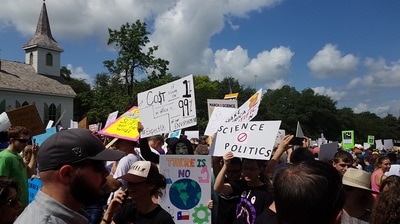
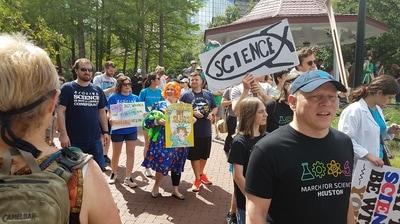
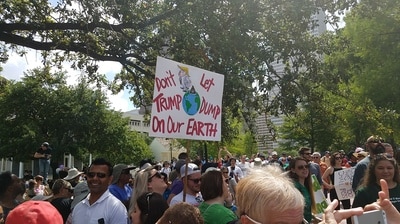



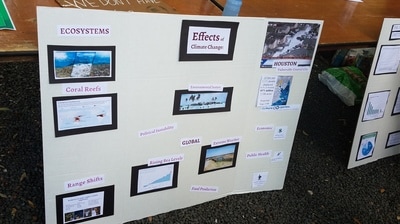

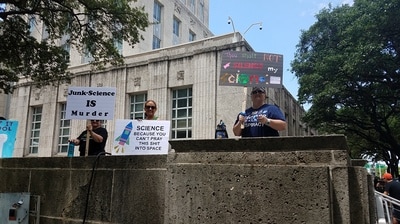
 RSS Feed
RSS Feed